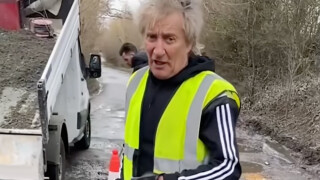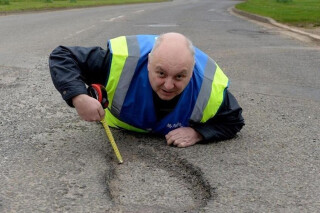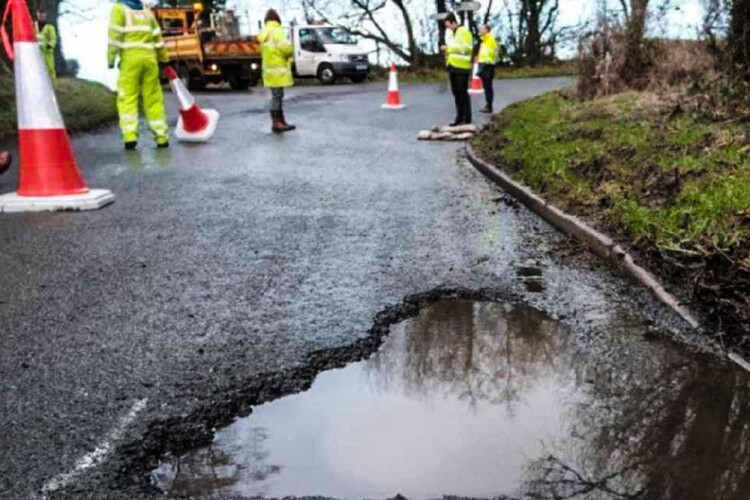When the RAC released its Pothole Index for July to September 2021, it revealed the highest number of pothole-related callouts in any third quarter since 2006.
RAC patrols attended 1,810 breakdowns for broken suspensions, distorted wheels and damaged shock absorbers which, together, accounted for 1.2% of all its callouts over the three-month period. This is despite July to September usually being one of the quietest quarters for pothole-related breakdowns.
The Annual Local Authority Road Maintenance (Alarm) survey from the Asphalt Industry Alliance (AIA) illustrates the scale of the problem. The 2021 survey shows a jump from 1.5 million potholes filled in 2019/20 to 1.7 million in 2020/21 – the equivalent of one pothole being repaired every 19 seconds in England (including London) and Wales.
Not surprisingly, drivers are becoming increasingly concerned. The latest annual Safety Culture report by IAM Roadsmart (formerly the Institute of Advanced Motorists) shows that potholes are the fastest-growing cause for concern among its members.
Three quarters of drivers are more worried about potholes now than they were in 2017 and nearly nine out of ten surveyed said they were affected by potholes in the past year. IAM Roadsmart found that nearly a third (31%) of motorists have even changed their route to work to avoid pothole-riddled roads.
In his March 2020 budget, chancellor Rishi Sunak announced a £2.5bn pothole repair fund equating to £500m allocated for pothole repairs annually until 2025. Consequently, the AIA says, pothole repairs now account for around 70% of all defects dealt with by local authorities.
This pothole repair fund boils down to about £1m per local authority per year. But the AIA says the increased number of potholes filled “is a reflection of the reduced investment in programmed work, which has resulted in poorer road conditions.” For many people, the government’s £500m annual pothole budget is simply paying for sticking-plaster solutions.
These worrying figures paint a picture of a worsening pothole crisis on our roads, with many local authorities simply unable to get ahead of the problem.

Adopting a ‘right first time’ approach is undoubtedly the best solution to pothole repairs. This usually involves planing out and relaying sections of the road where potholes are evident and laying new asphalt. This is a long-term solution (such repairs are guaranteed for at least five years) but it is also more expensive and takes much longer to carry out than a simple patch-repair. This means longer delays for road users and less time to tackle the ever-growing backlog of potholes.
Many local authorities are struggling to meet demand for pothole repairs because they are relaying roads and simply cannot move onto the next repair quickly enough. Figures compiled last year by financial services comparison website GoCompare show that the average wait time for a pothole repair is three weeks, while some potholes might be left for up to four months before being filled. Some local authorities have been obliged to delay repairs by up to 18 weeks due to the backlog.
There is of course a balance to strike between a quick fix and a long-term repair but as pothole numbers rise (and with each local authority in England undertaking an average 13,300 pothole repairs in 2020/21 according to the ALARM survey) there is a growing case for short-term solutions.
Part of the motive for councils is to minimise the ongoing threat of litigation for vehicle repairs and personal injury claims. Another piece of industry market research, this time from used-car dealer Heycar, shows that local authorities paid out a total of £8m in claims for damage caused by potholes in 2019/20 – including more than £1.1m by Manchester City Council alone.
So, while motorists fume at local authorities for the poor state of their roads, and the designated neighbourhood highways officer keeps a low profile, materials producers are busy developing products designed to make the temporary quick-fix option more palatable. There is now a wide range of formulations available pre-mixed in bags, tubs or in bulk for quick, reactive fill-and-go pothole repairs.
The development of cold-lay asphalt means that such repairs can be completed in less than two hours and immediately opened to traffic – whereas a thorough planing and relaying repair might take a whole day.

Products like Tarmac’s cold-lay Ultipatch asphalt promise fast small-scale road repairs using modern binder technology for easy compaction in all weather conditions. In fact, Tarmac says that Ultipatch, which has BBA and HAPAS (Highways Authority Product Approval Scheme) approval, can be used to make permanent repairs, not just a temporary fix.
Other tempting solutions include Scottish firm MacRebur’s Plastikfix product, made from recycled plastic waste, and Ronacrete’s Ronaroad Greenpatch cold-lay product, which has been used to repair Scottish potholes at temperatures below -20oC. On the equipment side, JCB has even developed a machine, the PotholePro, based on its Hydradig excavator, specifically for carrying out rapid patch-repairs.
Mindful of the public dissatisfaction with the worsening state of our local roads, the government wants to be seen to be tackling the problem, hence the £2.5bn pothole repair fund. Last month, transport secretary Grant Shapps promised to introduce financial penalties for utilities companies “responsible for leaving potholes on the country’s roads” after carrying out streetworks.
“The plague of potholes is the menace of our roads,” said Shapps. “That’s why I’m ensuring companies who create them and leave roads in a poor state can be held to account more easily – protecting drivers from unfair repair costs.”
But as every motorist knows, a pothole is not necessarily the product of a poor streetworks reinstatement. In fact, as the AIA points out, the problem is mostly the result of a chronic underinvestment by local highways authorities in planned maintenance. And Sunak’s pothole repair fund, while seemingly generous, might not be enough to stop the pothole problem from becoming even worse.

Pensioners and rock stars try their hand at road repairs

Such is the frustration at the worsening pothole crisis that some private individuals have decided to take matters into their own hands.
In April this year an 89-year-old pensioner from Newcastle-upon-Tyne paid more than £4,000 of her own money to have potholes repaired in the road outside her home.
Elizabeth Williams – who doesn’t drive and has never owned a car – told the Daily Mail that after four years of inaction she was fed up with cars mounting the pavement outside her home in Wyncote Court to avoid “metre-wide craters” in the road.
“I just wanted to do something about it,” she explained. “I thought, ‘bugger it, I’m just going to do it’. It was also a gift to my neighbours, who are very nice, and to our estate,” she added.
After four years of petitioning Kingston Property Services, the company responsible for maintaining the road, Williams says the last straw was to be told that Kingston could not find a contractor to do the work. Within a week, she had secured three quotes herself and passed them on to Kingston.
The response was that the contractor would have to register with Kingston and, even then, was not guaranteed to be awarded the contract. Williams therefore paid over £4,000 of her own money to have the work done; Kingston says it has since reimbursed her.
A more widely-reported instance of DIY pothole repair occurred in March when veteran rock star Rod Stewart posted a video of himself on Instagram filling in potholes in a lane near his home in Harlow, Essex.
Stewart, wearing a high-vis jacket and accompanied by a team of helpers, said: “I’m repairing the street where I live because nobody can be bothered to do it.
“People are bashing their cars up. The other day there was an ambulance with a burst tyre - and my Ferrari can’t go through here at all. So me and the boys thought we’d come and do it ourselves,” he explained.
Although the 77-year-old rocker’s actions were praised by other locals, Essex County Council and the RAC were both quick to warn people not to follow his example.

Lee Scott, cabinet member responsible for highways maintenance at Essex County Council told the BBC that anyone attempting to repair a road could become liable for any accidents: “You can’t take matters into your own hands,” he said. “People must always report potholes to the council and we will fix anything that’s dangerous.”
A spokesman for the RAC also pointed out that DIY repairs are unlikely to conform to the highways authority’s standards and procedures and that in any case, working in the road is dangerous.
A more measured approach is being taken by road safety campaigner Mark Morrell – who calls himself Mr Pothole – from Brackley, Northamptonshire.
In March, Morrell told his local paper, the Banbury Guardian, that he was planning to set up a website offering “a DIY legal route to force councils and government to fix the worsening state of our roads”.
Responding to news that the backlog of road repairs in the south-east had topped £3bn, Morrell said: “I’m not surprised. It’s increased by over £2bn in 12 months”.
Morrell says his Resurface our Roads website will offer letter templates and a step-by-step guide to help people make formal complaints.
“We will help them issue the council with a Section 56 legal notice that the road is out of repair. This is a statutory notice which the council has to obey or they could go to court,” said Morrell.
He added: “I am sick of government spin about how much they are investing in our roads. Very little is actually being spent on maintenance. This why we have seen such a massive increase in the roads maintenance backlog which will get worse year on year.
Got a story? Email news@theconstructionindex.co.uk



